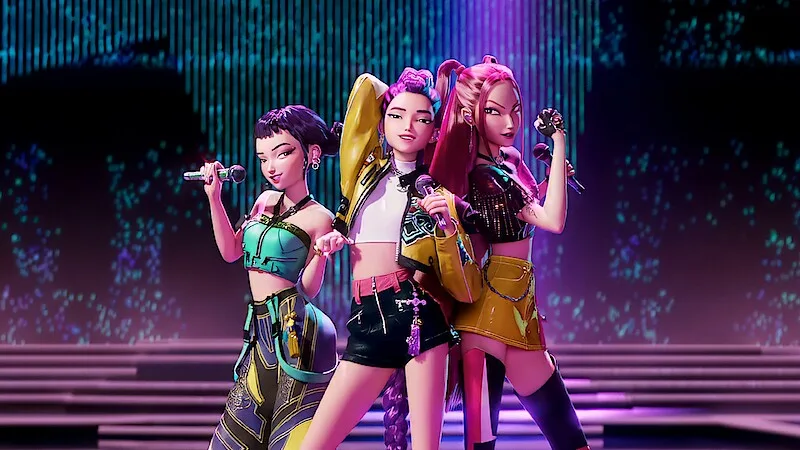When K-Pop Demon Hunters first dropped on Netflix back on June 20, 2025, nobody quite expected it to take over the cultural conversation the way it did. Sure, it had the right mix on paper—K-pop flash, high-energy animation from Sony Pictures Animation, and a premise so delightfully over-the-top it practically dared you not to watch. But what happened next was something different. The film didn’t just land—it exploded. In a summer stacked with blockbusters and endless content drops, K-Pop Demon Hunters became Netflix’s most-watched animated original ever, racking up a staggering 158.8 million views and sliding neatly into the streamer’s top-four English-language films of all time. For weeks, it sat like a neon-lit crown jewel in Netflix’s trending row, powered not just by viewers but by repeat viewings, rewatches, and obsessive fan chatter.
The story’s a blend of idol drama and supernatural chaos—Rumi, Mira, and Zoey, members of the fictional K-pop group Huntr/x, juggling stadium tours and demon-slaying duties in a Seoul that looks like it was designed by a DJ with an anime obsession. Their big threat? The Saja Boys, a rival boy band summoning literal demons through their music, because of course they are. The plot rockets forward with fight scenes that feel choreographed like music videos and songs that worm their way into your brain after a single chorus. It’s all heightened, all electric, and all anchored by a surprisingly emotional through-line about identity, family, and the pressure to be what others expect.
The soundtrack became its own juggernaut. “Golden” topped the Billboard Global 200, bouncing in and out of the number-one slot for weeks, while “Your Idol” took over Spotify’s U.S. chart and even outranked BTS’s “Dynamite” in its peak moment. The album debuted in the Billboard 200’s Top 10 and climbed to number three the following week—the best debut for a soundtrack this year. These weren’t just movie tie-in songs; they were full-blown pop hits, turning fictional idols into real-world chart climbers. TWICE even performed “Takedown” live at Lollapalooza, drones spelling out a cryptic message from the film mid-set, as if blurring the line between the movie’s universe and ours wasn’t already part of the fun.
Now, after conquering streaming and the charts, K-Pop Demon Hunters is flipping the usual release playbook. Instead of theaters first, streaming later, Netflix is taking the hit back to the big screen for a special sing-along event on August 23 and 24. Just two days, select theaters, and limited showtimes. Regal, Cinemark, and a handful of other chains are on board, but in places like New York City, showings are scarce enough that you’ll have to grab tickets the moment they go live if you want a shot at belting “Golden” in a room full of strangers who know every lyric. And make no mistake, they will know every lyric. This isn’t a passive watch—it’s a communal, joyful, slightly chaotic celebration of a film that’s already been lived, breathed, and memorized by millions.
There’s something fitting about it. K-Pop Demon Hunters thrives on energy—on the high of a perfectly timed drop, on the rush of a crowd moving as one. It’s a story about the power of music to bring people together, whether to fight demons or just to feel less alone, and now it’s being reimagined as a live experience where you can literally sing those feelings into the air. Streaming has its perks, but there’s no substitute for that shared moment when the lights go down, the first notes hit, and everyone around you is right there with you.
Whether this is just a victory lap or the first step toward a bigger theatrical presence for the film is still an open question. Fans are already speculating about sequels, stage adaptations, even TV spin-offs. A live-action remake was briefly teased but quickly walked back after online pushback—proof that for now, at least, people want to keep this world in the vibrant, animated form where it was born. Whatever happens next, these two August nights feel like the perfect way to cap off a summer where a neon-soaked, demon-slaying girl group didn’t just capture attention—they owned it.
Source:Polygon



